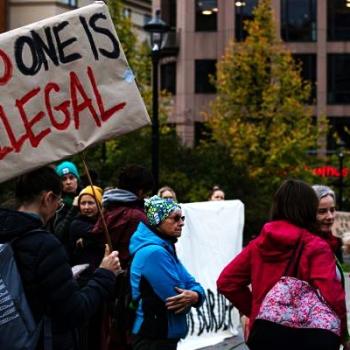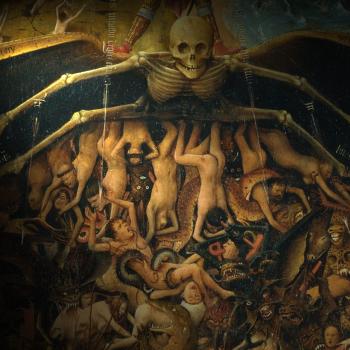 When we think of the defenders of a Christian America today, the Christian Right immediately comes to mind. We think of people like Glenn Beck (who despite his Mormonism has joined forces with many Christian nationalists), David Barton, Peter Marshall and David Manuel, or Newt Gingrich. All of these public figures have championed the idea that the United States was founded as a Christian nation. Their careers have been defined by the belief that this country needs to return to its Christian roots in order to receive the blessings of God.
When we think of the defenders of a Christian America today, the Christian Right immediately comes to mind. We think of people like Glenn Beck (who despite his Mormonism has joined forces with many Christian nationalists), David Barton, Peter Marshall and David Manuel, or Newt Gingrich. All of these public figures have championed the idea that the United States was founded as a Christian nation. Their careers have been defined by the belief that this country needs to return to its Christian roots in order to receive the blessings of God.
Rarely, if ever, do we hear the name Martin Luther King, Jr., included in this list of apologists for Christian America. Yet he was just as much of an advocate for a "Christian America" as any who affiliate with the Christian Right today. Let me explain.
King's fight for a Christian America was not over amending the Constitution to make it more Christian or promoting crusades to insert "under God" in the Pledge of Allegiance (June 14, 1954). It was instead a battle against injustice and an attempt to forge a national community defined by Christian ideals of equality and respect for human dignity.
Most historians now agree that the Civil Rights movement was driven by the Christian faith of its proponents. As David Chappell argued in his landmark book, Stone of Hope: Prophetic Religion and the Death of Jim Crow, the story of the Civil Rights movement is less about the triumph of progressive and liberal ideals and more about the revival of an Old Testament prophetic tradition that led African-Americans to hold their nation accountable for the decidedly unchristian behavior it showed many of its citizens.
There was no more powerful leader for this kind of Christian America than King, and no greater statement of his vision for America than his famous "Letter from a Birmingham Jail."
King arrived in Birmingham in April 1963 and led demonstrations calling for an end to racist hiring practices and segregated public facilities. When King refused to end his protests, he was arrested by Eugene "Bull" Connor, the city's Public Safety Commissioner. In solitary confinement, King wrote to the Birmingham clergy who were opposed to the civil rights protests in the city. The "Letter from a Birmingham Jail," published in pamphlet form and circulated widely, offered a vision of Christian nationalism that challenged the localism and parochialism of the Birmingham clergy and called into question their version of Christian America.
A fierce localism pervaded much of the South in the mid-20th century. For Southerners, nationalism conjured up memories of the Civil War and Reconstruction, a period when Northern nationalists—Abraham Lincoln, the "Radical Republican" Congress, and the so-called "carpetbaggers—invaded the South in an attempt to force the region to bring its localism in line with a national vision informed by racial equality.
When he arrived in Birmingham, King was perceived as an outside agitator intent on disrupting the order of everyday life in the city. Many Birmingham clergy believed that segregation was a local issue and should thus be addressed at the local level.
King rejected this kind of parochialism. He fought for moral and religious ideas such as liberty and freedom that were universal in nature. Such universal truths, King believed, should always trump local beliefs, traditions, and customs. As he put it, "I am in Birmingham because injustice is here." Justice was a universal concept that defined America. King reminded the Birmingham clergy that Thomas Jefferson and Abraham Lincoln had defended equality as a national creed, a creed to which he believed the local traditions of the Jim Crow South must conform. In his mind, all "communities and states" were interrelated. "Injustice anywhere," he famously wrote, "is a threat to justice everywhere." He added: "Anyone who lives inside the United States can never be considered an outsider anywhere within its bounds." This was King the nationalist at his rhetorical best.
King understood justice in Christian terms. The rights granted to all citizens of the United States were "God given." Segregation laws, King believed, were unjust not only because they violated the principles of the Declaration of Independence ("all men are created equal") but because they did not conform to the laws of God.
King argued, using Augustine and Aquinas, that segregation was "morally wrong and sinful" because it "degraded "human personality." Such a statement was grounded in the biblical idea that all human beings were created in the image of God and as a result possess inherent dignity and worth.





